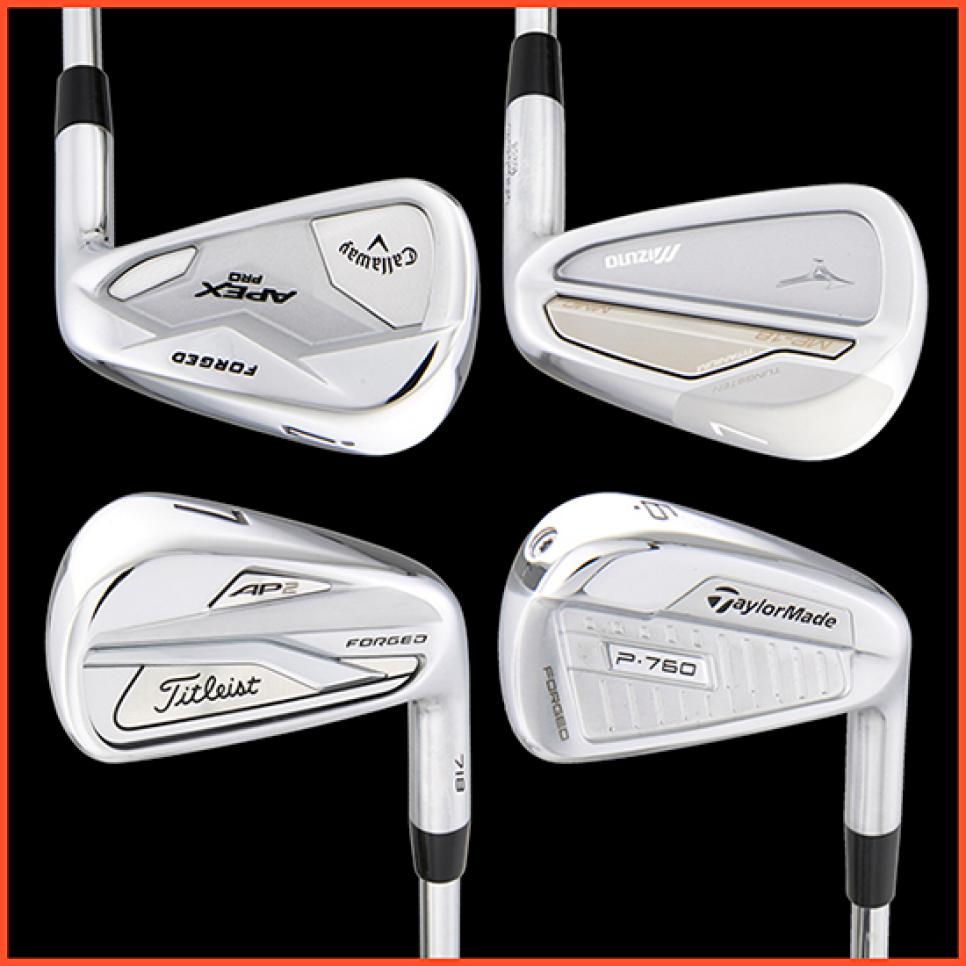Equipment
Best Players Irons 2019: 12 sets of irons designed for the better player

You might not have a name plate on the practice range, but your swing is still the envy of almost everyone on it. They stop and watch you hit balls. You are a player. And the irons you use state that fact to anyone peeking in your bag.
What they don’t know is that today’s players irons have changed greatly to where some of them have enough forgiveness features to rival game-improvement clubs. Helping this is the ability of designers to produce clubs with more forgiveness that are still workable and have toplines and sole widths thin enough to appeal to better players. Most of these irons continue to be forged from a soft metal such as 1025 carbon steel although some are still cast. Many manufacturers also realize that even better players need some help with the long irons, leading to the use of tungsten or other means in the long irons to lower the center of gravity for an easier launch. Conversely, better players want their short irons to not get too high in the air, so adding weight to the topline or taking weight out of the sole area to raise the center of gravity checks that crucial box.
Oh, and if you think having all that technology in a visually appealing package isn’t cool enough for you, take a look at what’s being played on the PGA Tour, and you’ll see most of the irons on this list. After all, being a player doesn’t mean that you have to be overly proud.
Gold-medal winners:

Story: Callaway wanted a powerful iron with a more palatable look. The first step was adding a cupface through the 7-iron to help boost distance. The low and middle irons have internal tungsten encased in urethane with microscopic air bubbles for a lower center of gravity (CG) and just the right sound. About 25 grams of tungsten were positioned high on the 9-iron through gap wedge to bring the CG up for a more controlled flight.
Lofts: 7-iron: 33 degrees; PW: 45 degrees
Street Price: $1,400
Story: This version of the X Forged might strike knowledgeable golfers as similar to a Callaway forged iron from earlier this decade. Well, that’s on purpose. Born out of elite players saying they hit modern players irons too far, the X Forged focuses on subtle improvements instead of raw distance. The single-piece forging features a weight pad in the rear cavity that moves progressively through the set to optimize trajectory. It’s an old-school look with modern thinking.
Lofts: 7-iron: 33 degrees; PW: 45 degrees
Street Price: $1,400
Cobra MB/CB
Story: This set has forgiving cavity-backs through the 6-iron and traditional muscle-backs the rest of the way. To concentrate more weight in the center and less on the periphery, tungsten weights are used in the toe and sole to lower the center of gravity and improve ball speed. Other nice touches are the milled face and grooves—the same grooves Cobra uses on its wedges. At address and in the bag, the Diamonized Black Metal finish is bad-ass cool.
Lofts: 7-iron: 34 degrees; PW: 46 degrees
Street Price: $1,100
Story: The most technologically sophisticated member of Mizuno’s MP family is the MP-18 MMC. Titanium forged (with no welding) into the carbon-steel clubhead works with tungsten weighting in the toe of the middle and long irons for extra forgiveness. The 20-gram tungsten plug fits in an internal cavity that allows it to rest deeper as lofts get lower (and soles get wider) to increase forgiveness progressively. Plus, the look will be the envy of your playing partners.
Lofts: 7-iron: 34 degrees; PW: 46 degrees
Street Price: $1,200
Story: The most technologically sophisticated member of Mizuno’s MP family is the MP-18 MMC. Titanium forged (with no welding) into the carbon-steel clubhead works with tungsten weighting in the toe of the middle and long irons for extra forgiveness. The 20-gram tungsten plug fits in an internal cavity that allows it to rest deeper as lofts get lower (and soles get wider) to increase forgiveness progressively. Plus, the look will be the envy of your playing partners.
Lofts: 7-iron: 32 degrees; PW: 46 degrees
Street Price: $1,050, set of seven
Story: This forged iron is sure to appeal to the traditionalist ready to graduate from muscle-back blades. The split-cavity design features a low muscle-back with an upper cavity through the set, but with a topline and head shape that easily let you mix and match with the MP-18 muscle-back blade. The trailing and leading edges of the sole—slightly wider than the MP-18—help the club power through the turf with the ease of a bulldozer.
Lofts: 7-iron: 34 degrees; PW: 46 degrees
Street Price: $1,200
PXG 0311 T GEN2
Story: It’s called GEN2, but these irons are more than a sequel to the original 0311—it’s a significant advancement. A new polymer material is used inside the clubhead to increase distance and deliver a pleasing sound and feel. The company’s hallmark weights in the back remain, but there are two fewer in the toe area than in the previous version, the result of a design change that moved more mass to the toe, allowing for the elimination of those weights.
Lofts: 7-iron: 32 degrees; PW: 46 degrees
Street Price: $3,200
Story: The i210 is the latest in a long tradition of Ping irons designed to produce reliable results for a variety of ability levels. There’s now a larger elastomer port in the back that improves feel and increases perimeter weighting. The 431 stainless-steel head (a softer steel than traditional 17-4) features milled grooves with a different geometry for the pitching and gap wedges to better accommodate the type of shots hit with those clubs.
Lofts: 7-iron: 33 degrees; PW: 45 degrees
Street Price: $875, set of seven
Story: The iBlade’s classic shape masks a host of sophisticated technology. Visible is an elastomer insert wedged into the rear cavity. The insert minimizes unwanted vibration and allows the thin face to flex at impact. A high-density tungsten weight averaging 23 grams is positioned in the low toe to aid stability. Subtle adjustments include the bounce angles and additional heel relief on the soles of the 3- through 7-irons. After all, sophistication comes in many forms.
Lofts: 7-iron: 34 degrees; PW: 46 degrees
Street Price: $1,200
Story: Sometimes irons in this category can push golfers beyond what they’re willing to accept in terms of game-improvement features or looks. The P760 addresses those concerns by creating a set in which nearly everything is progressive in form. Blade length, topline width, offset and even the amount of foam (to foster ball speed) injected into the 3- through 7-irons is done to varying degrees specific to each club. All of which makes this a club worth considering.
Lofts: 7-iron: 33 degrees; PW: 46 degrees
Street Price: $1,400
Story: Titleist strikes a nice balance between offering help and letting the golfer do the work. The forged design—played by most PGA Tour players on the Titleist staff—focuses on forgiveness and consistency in the low and middle irons with the use of two densities of tungsten in the heel and toe (an average of 57 grams) to provide stability. Those clubs also feature a speedy face insert made from high-strength steel at only 2.1 millimeters thick.
Lofts: 7-iron: 34 degrees; PW: 46 degrees
Street Price: $1,300
Silver-medal winners:
New Level 902 Forged
Story: One of the advantages of being a small company is that you can do some things that the larger companies can’t. Like milling the entire clubhead. This iron uses a one-piece raw forging that starts off about 20-percent larger than its final size. The company mills it close to its final state. This includes milling the grooves, face and rear extremities to produce maximum consistency from club to club because less hand grinding is required.
Lofts: 7-iron: 32 degrees; PW: 45 degrees
Street Price: $1,400, set of seven
Srixon Z785
Story: Srixon’s Z Series irons are known for being sweet-feeling, forged irons, and nothing has changed here. The one-piece forged Z 785 uses 1020 carbon steel for optimum feel. The shaping has changed from the Z 765 to include more compact short irons and progressive sole widths. Extra mass behind the hitting area promotes the soft forged feel better players prefer. A redesigned sole changes through the set to match the attack angles of long and short irons.
Lofts: 7-iron: 32 degrees; PW: 46 degrees
Street Price: $1,000, set of seven
Yonex EZone CB 501
Story: If the rule of real estate is location, location, location, then the edict for players irons could be feel, feel and feel. Yonex went all in on that idea. A vacuum-heat treatment makes this forging about 20-percent softer than traditional forgings. A graphite damping material in the rear cavity further reduces unwanted vibrations. Finally, a gently cambered sole design helps chunky shots feel, well, not so chunky.
Lofts: 7-iron: 32 degrees; PW: 46 degrees
Street Price: $1,920